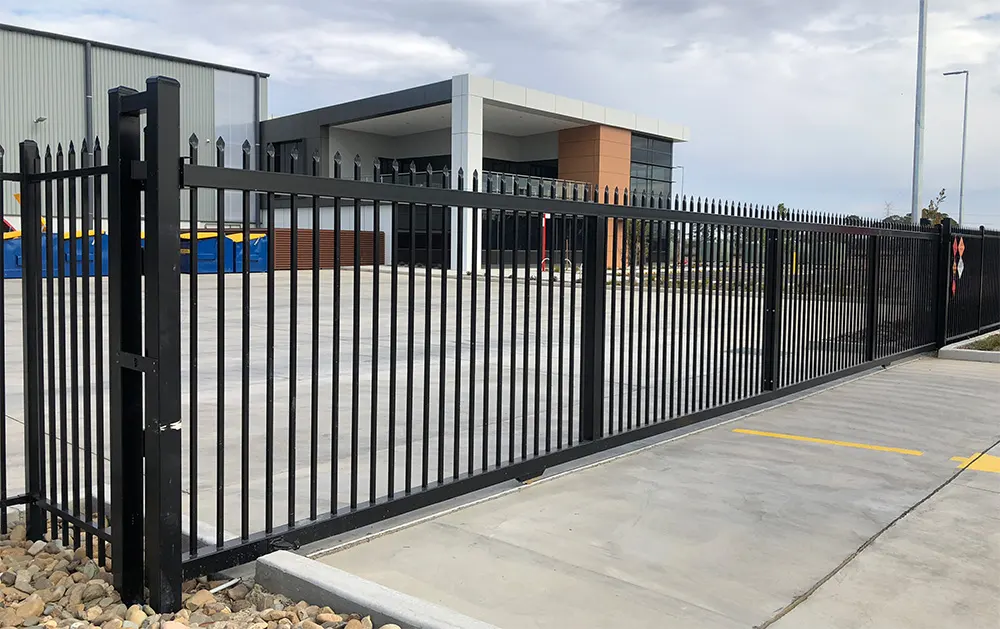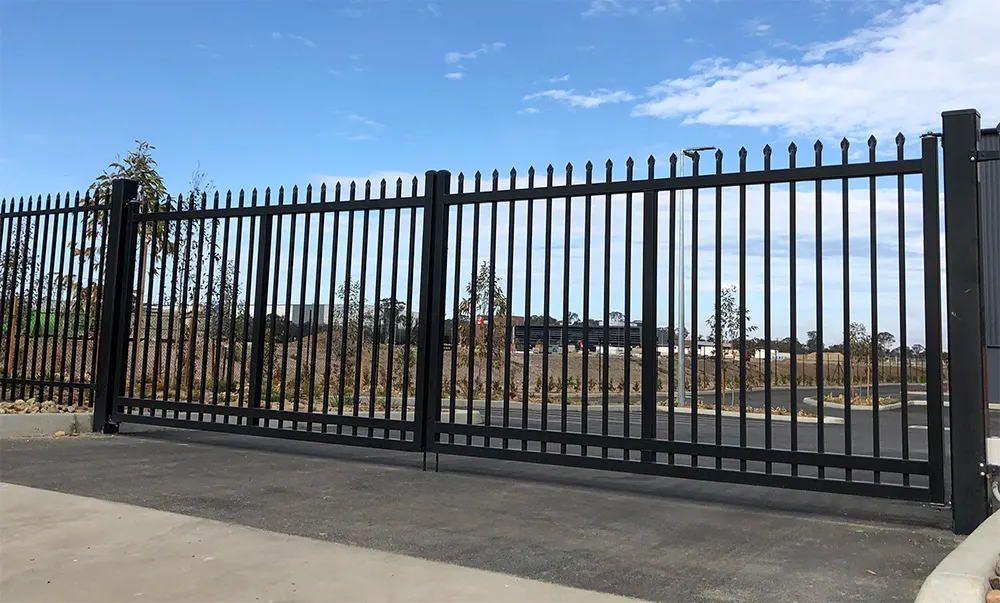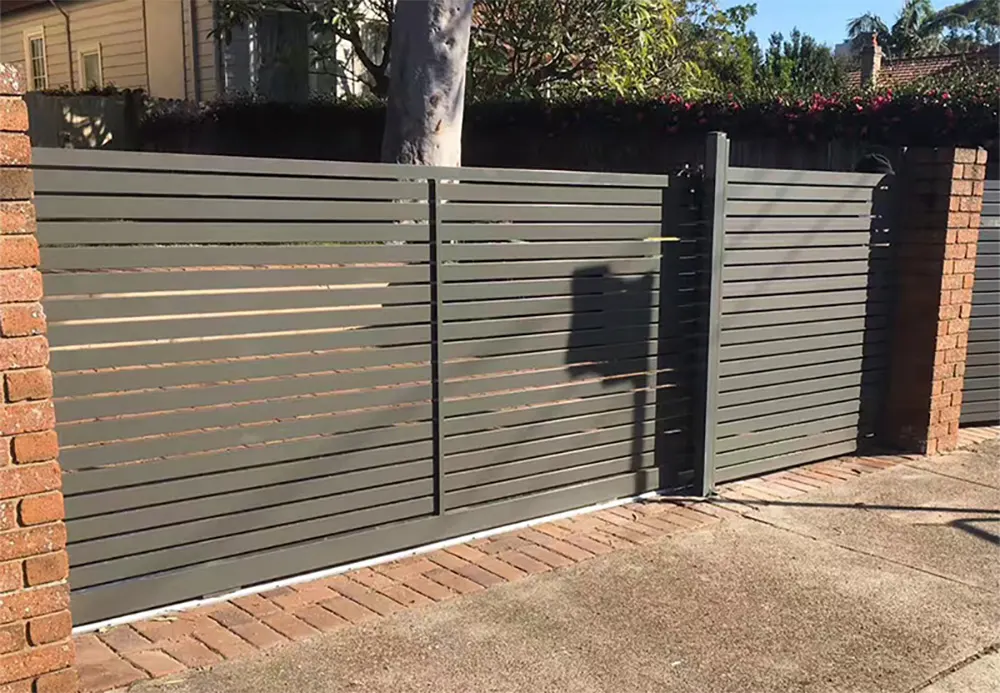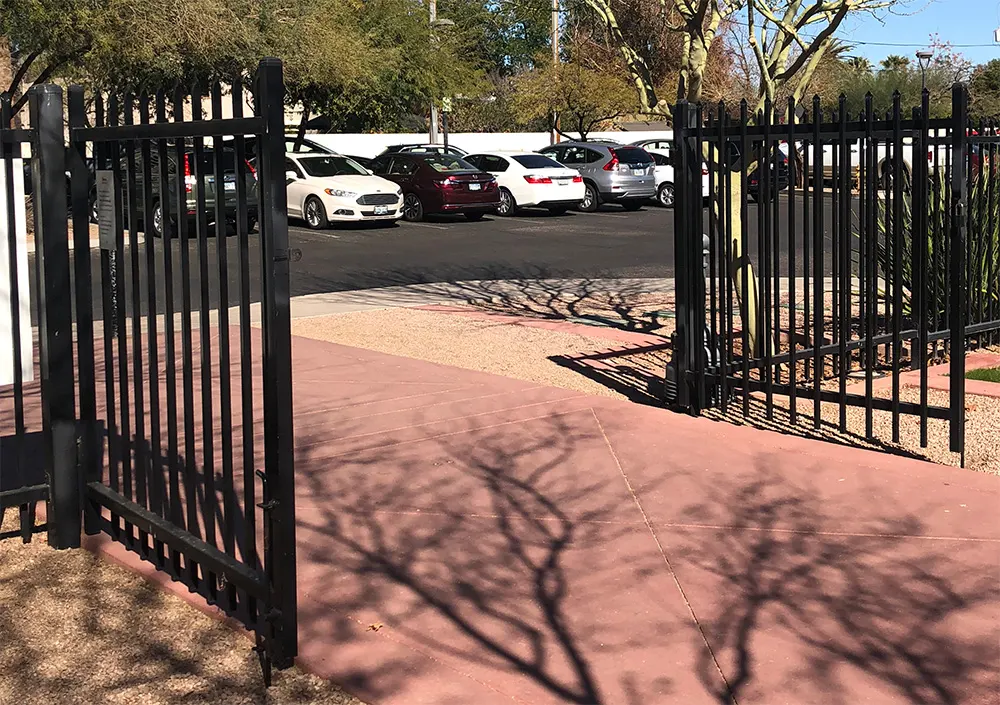Selecting the right gate is more than an aesthetic decision—it directly impacts security, convenience, maintenance costs, and the long-term value of your property. Steel and aluminum remain the most popular options, each offering distinct advantages depending on your needs.

Whether you are securing a residential estate, a commercial facility, or a coastal property, understanding the nuances of these materials is crucial. This guide evaluates steel and aluminum gates across eight key dimensions to help you make an informed choice.
1. Security: Strength Matters

Steel Gates
Steel gates are renowned for their exceptional strength. Constructed from solid mild or stainless steel, they can withstand significant impacts and provide a strong deterrent against intrusion. For instance:
-
A standard 3-meter steel gate can weigh between 180–250 kg, requiring robust hinges and posts.
-
Steel gates offer high resistance to bending and break-ins, making them ideal for high-crime areas or commercial properties.
Steel gates are often preferred where maximum security is a priority, such as gated communities, industrial sites, and commercial facilities.
Aluminum Gates
Aluminum gates, though lighter, still offer adequate protection for most residential and low-traffic commercial environments. Key points include:
-
Aluminum has inherent corrosion resistance, which preserves structural integrity even in humid or coastal areas.
-
Standard aluminum gates weigh around 60–120 kg for a 3-meter span, making them easier to operate while still providing security.
While not as heavy-duty as steel, aluminum gates deter casual intruders effectively, especially when combined with automation and modern locking systems.
2. Ease of Use and Convenience
The operational weight of a gate affects everyday usability, mechanical stress, and longevity.

Steel Gates:
-
Heavier weight can create challenges for manual operation, especially for gates exceeding 250 kg.
-
Automatic openers may require higher torque motors, increasing installation cost and energy consumption.
-
Once installed properly, operation is smooth, but minor adjustments or repairs may require professional help.
Aluminum Gates:
-
Lightweight construction reduces stress on hinges and automation systems.
-
Easier to operate manually or automatically, ideal for residential homes or properties where frequent access is required.
-
Less wear on moving components translates to lower long-term maintenance of motors and hardware.
Practical Tip: Aluminum gates are often recommended for DIY installations or areas where frequent gate operation occurs, such as small residential driveways.
3. Cost and Maintenance
Maintaining gates is critical to their longevity and appearance.

Steel Gates
-
Require periodic painting or powder coating to prevent rust, especially in humid or coastal regions.
-
Long-term durability is excellent: with proper maintenance, steel gates can last 30–40 years.
-
Upfront cost is higher due to material weight and installation requirements, but longevity can justify the investment.
Pros: Extreme durability, high security, wide design options
Cons: Regular maintenance, higher initial installation cost
Aluminum Gates
-
Naturally resistant to corrosion; minimal painting or coating is required.
-
Typically have a lifespan of 20–25 years, sufficient for most residential and light commercial applications.
-
Lower installation cost due to lighter weight and less demand on supporting structures.
Practical Tip: For properties in coastal areas, aluminum is particularly advantageous due to its low-maintenance nature and resistance to salt-induced corrosion.
Image suggestion: Table comparing steel vs. aluminum gates: installation cost, maintenance frequency, lifespan, and corrosion resistance.
4. Aesthetic Appeal: Style Meets Function
Steel Gates
Steel gates convey a timeless, classic appearance. They are often chosen for their ornamental designs and ability to complement traditional or luxurious architectural styles. Key features:
-
Intricate wrought-iron patterns and decorative elements
-
Wide variety of finishes: powder-coated black, galvanized, or custom colors
-
Can be fabricated into heavy, imposing designs for a premium look
Pros: Elegant, highly customizable, visually commanding
Cons: Heavyweight designs may limit installation options
Aluminum Gates
Aluminum gates are highly versatile in appearance, combining modern design with functional benefits. Advantages include:
-
Can mimic wrought iron or wood textures while remaining lightweight
-
Available in multiple colors and finishes
-
Easier to customize for contemporary or minimalist aesthetics
Practical Tip: Aluminum gates are ideal for properties where visual harmony with modern architecture is important without sacrificing practicality.
Image suggestion: Split-gallery showing steel gate with ornate design vs. aluminum gate with sleek modern look.
5. Environmental Considerations
Steel Gates
-
Steel production is energy-intensive and has higher carbon emissions.
-
However, steel is highly recyclable, and using recycled steel reduces environmental impact significantly.
-
Sustainable sourcing can further minimize ecological footprint.
Aluminum Gates
-
Aluminum requires less energy to produce and is also fully recyclable.
-
Recycled aluminum maintains almost the same material properties, making it an eco-friendly alternative.
-
Particularly suitable for property owners focused on low carbon footprint solutions.
6. Installation Costs and Practical Considerations
Steel Gates:
-
Heavier weight necessitates reinforced posts, heavier hinges, and possibly professional installation.
-
Installation costs can range from $1,500–$5,000 for standard residential gates, depending on size and complexity.
-
Suitable for permanent, high-security installations where longevity justifies the investment.
Aluminum Gates:
-
Lightweight construction allows easier installation and often lower labor costs.
-
DIY-friendly for smaller gates; professional installation recommended for automated systems.
-
Installation costs typically 20–30% lower than comparable steel gates.
7. Longevity Comparison
-
Steel Gates: With proper maintenance, steel gates can last 30–40 years, offering unmatched durability.
-
Aluminum Gates: Resistant to rust, aluminum gates typically last 20–25 years, sufficient for most residential or light commercial uses.
Practical Tip: Consider climate, exposure to elements, and maintenance capacity when deciding between steel and aluminum for long-term investment.
8. Typical Application Scenarios
| Scenario | Recommended Material | Reasoning |
|---|---|---|
| High-security residential or commercial | Steel | Maximum strength, impact resistance |
| Coastal or humid regions | Aluminum | Corrosion-resistant, low maintenance |
| Residential with frequent use | Aluminum | Lightweight, easy operation |
| Luxury estates or traditional architecture | Steel | Ornamental, elegant design |
| Modern/minimalist properties | Aluminum | Sleek, versatile appearance |
Conclusion
Selecting the right gate requires balancing security, convenience, cost, aesthetics, and sustainability:
-
Steel Gates: Optimal for high-security applications, long-term durability, and a classic, commanding look. Ideal for commercial sites or luxury estates.
-
Aluminum Gates: Best suited for low-maintenance, lightweight operation, modern aesthetics, and environmentally conscious decisions. Suitable for residential, coastal, or frequently used gates.
Key Takeaway: Evaluate your property’s specific needs—security requirements, maintenance capacity, visual preferences, budget, and environmental priorities—before making a choice. Both steel and aluminum gates can enhance property security and curb appeal, providing peace of mind and value for years to come.
